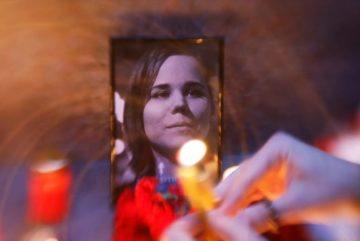 Masha Gessen in The New Yorker (Photograph by Maxim Shemetov / Reuters):
Masha Gessen in The New Yorker (Photograph by Maxim Shemetov / Reuters):
Darya Dugina, a twenty-nine-year-old Russian television commentator, was laid to rest at an undisclosed location in Moscow on August 23rd. Three days earlier, Dugina had attended a festival called Tradition, a daylong event that, this year, included a lecture by her father, the self-styled political philosopher Aleksandr Dugin, on the metaphysical dualism of historical thinking. The gathering concluded with a concert called “The Russian Cosmos.” Afterward, Darya Dugina drove away in a Toyota Land Cruiser. The car exploded, killing her. Aleksandr Dugin was apparently travelling in a different vehicle, and it seems likely that whoever killed Darya had meant to kill her better-known father. There has since been much speculation about the identity and motives of the killers, but little is known for certain. Still, some theories are better than others.
Western media accounts have portrayed Dugin as a sort of Putin whisperer, the brains behind the Kremlin’s ideology. He is not that, but his story tells a lot about recent Russian history and the current state of Russian society. Dugin came out of the Moscow cultural underground. The son of minor members of the Soviet nomenklatura, he was expelled from college and educated himself by reading banned and restricted literature. When I was researching Dugin’s story for my book “The Future Is History,” an ex-partner of his and the mother of his older child, Evgeniya Debryanskaya, remembered that Dugin, then in his early twenties, procured a copy of Martin Heidegger’s “Being and Time” on microfilm. He did not, of course, have a microfilm reader at home, so he rigged up a device designed for showing simple children’s reels and projected the book onto his desk. The arrangement was not ideal: it showed a barely visible mirror image of the text. Dugin read Heidegger backward, in the dark, and, according to Debryanskaya, lost some of his eyesight in the process. The symbolic potential of this story is staggering. Its literal meaning is informative: Dugin’s ability to self-educate was limited by censorship, isolation, and ignorance.
